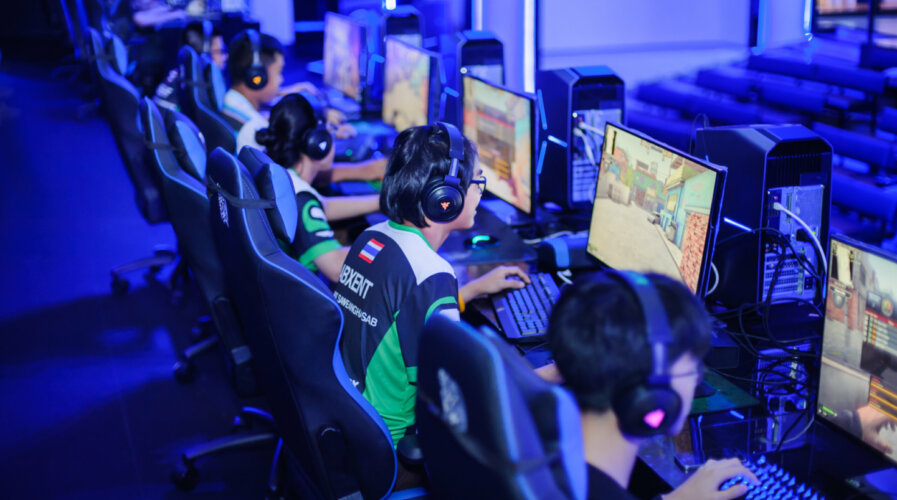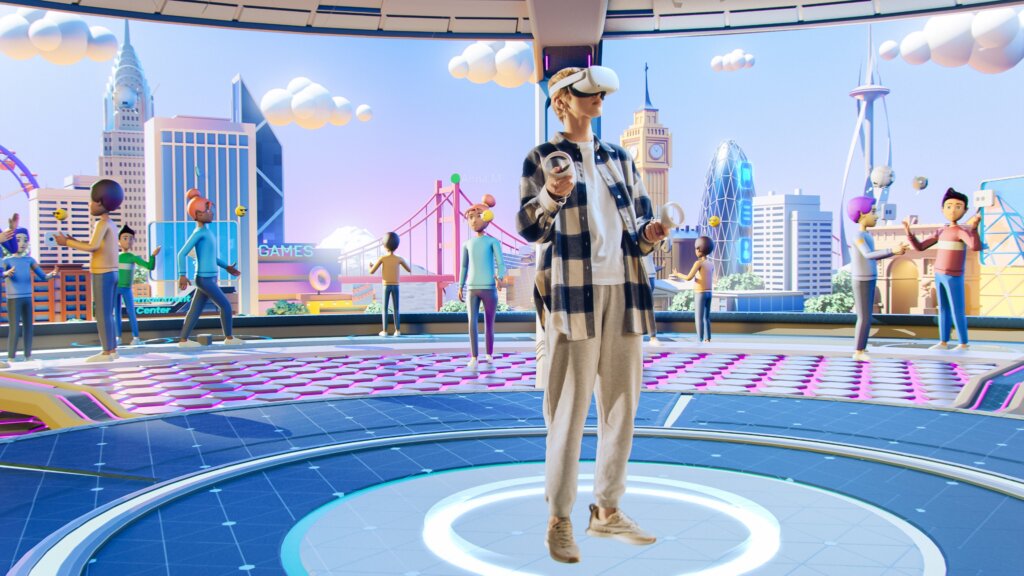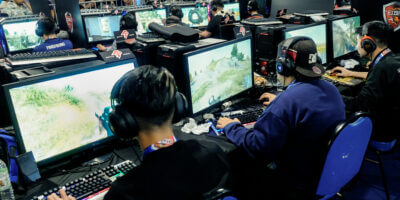
AI is reshaping gaming with dynamic experiences. (Source – Shutterstock)
How AI is changing the gaming experience – from players to developers to education
- AI is reshaping gaming with dynamic experiences but also sparking debates, like its impact on ‘Go.’
- AI in gaming offers personalized experiences and introduces new mechanics.
- It is also gradually being adopted in various other industries.
In a world where the line between reality and virtual experiences is continually blurring, AI in gaming stands as a frontier of limitless possibilities. Whether it’s the iconic Cortana guiding you through interstellar missions in Halo or the deep, introspective journeys of androids in Detroit: Becoming Human, artificial intelligence has become an integral part of modern gaming. But are these notable examples just the tip of the iceberg?
AI’s impact on gaming goes beyond creating compelling narratives and lifelike non-player characters (NPCs). Its footprint is much broader, infusing the gaming experience with dynamic responsiveness and complexity that evolves in real time. From providing an enhanced player experience to ensuring that games adapt to individual play styles, AI in gaming is setting a new paradigm for interactivity and engagement.
Prepare to embark on a deep dive into the gaming world, where AI not only complements but transforms how we interact, strategize, and immerse ourselves in digital universes.
The two sides of AI in player experiences: Frustration and learning
Tech Wire Asia recently spoke with Brandon Da Silva, CEO of ArenaX Labs, about how AI technologies like reinforcement learning are reshaping game development. According to Da Silva, gamers seem to fall into one of two categories regarding AI’s evolving impact on player experiences. For example, some may feel discouraged when AI characters “learn” from interactions and become more formidable opponents.

Brandon Da Silva, CEO of ArenaX Labs talks about gaming AI.
“For instance, if a game has AI characters that learn from each human player they interact with, those AI characters can eventually become better than any human player can be, which is frustrating for some,” he said. “On the other hand, there are players who see AI as a tool for their own learning: as AI players get better and better, they also learn from the AI’s moves, which improves their playing. One famous example of this was the game ‘Go.’”
Currently, professional Go players are increasingly incorporating AI programs into their training regimens. This enables them to accelerate their learning by studying AI-generated strategies. However, this has sparked a debate over whether AI could be undermining the essence of Go.
Critics argue that players are now merely memorizing AI-developed tactics, which could compromise the game’s inherent creativity and spontaneity.
Long heralded as a paragon of complexity and nuance, Go has captivated players with its endless possibilities and unpredictable gameplay. Yet as players increasingly turn to AI for guidance, a homogenization of strategy appears to be emerging, potentially reducing the game to a mere exercise in memory.
Da Silva also touched upon the potential of reinforcement learning to create dynamic gaming environments that adapt based on player behavior. “Game developers can harness this adaptive technology to up the ante as players progress, thereby providing ongoing challenges and rewards,” he added.
AI-driven games differ fundamentally from traditional games, especially in gameplay and user engagement. Da Silva believes the underlying theme is that AI offers the potential to create more expressive, dynamic, and personalized games.
From expert systems to machine learning: the evolution of AI in gaming
The truth is that AI has been used in gaming for a long time in the form of rules-based expert systems, which operate on the principle of “if this, then that.” When these systems are at play, the game designer is “God” – in other words, the creators of a game pre-define the “box” in which the game operates.
“Machine learning is different in that when it is used, there is no ‘box,'” Da Silva continued. “The game can evolve and change in whatever direction the data takes it. So the more that someone interacts with a game that employs machine learning in its core mechanics, the more personalized their player journey becomes. The game’s environment adapts to the data that only you provide it, so that the player journey is more unique to your experience. In a way, it makes games more like life.”
Further discussing the technology, Da Silva suggested that gaming can demystify the complex ‘deep tech’ behind AI, making it more accessible. He sees this playing out in two distinct ways in the industry: 1) enabling users to interact with the technology, and 2) helping them understand it.

The evolution of AI in gaming. (Source – Shutterstock)
“Providing accessibility to the understanding of how this tech works, however, is another matter. When you use ChatGPT or Midjourney, you might know that AI is the technology that is powering what you’re doing, but there’s no straightforward, clear way to learn about how it actually works. That’s why we created AI Arena – as a way for people to easily break through this knowledge barrier and learn more about how AI actually works,” Da Silva emphasized.
The game uses machine learning as one of its core mechanics, in that your AI fighters learn how to battle their opponents from players. But as players train their AI fighters, they also learn about the kinds of inputs that their AIs need to learn. So, in a way, AI Arena is a bit of a “trojan horse” for learning about how machine learning works. Da Silva noted that people who play this game are subconsciously educating themselves – and having fun.
Beyond the widespread discussion about large language models, Da Silva pointed out that generative art models are becoming increasingly popular for creating in-game assets, thereby reducing development costs.
Personalization: The next frontier in AI and gaming
He explained that the next frontier is AI models that personalize the player’s journey. While no specific set of tools can accomplish this right now, the ultimate goal is to create games that adapt to individual play styles in real time.
Given AI’s impact across various industries, and its emerging role in gaming, Da Silva is optimistic about its potential to improve public understanding and perception. “Our hope with AI Arena is to educate people about machine learning so that they understand it and become less fearful of it – so that they know that it isn’t as scary as it’s often made out to be,” he added.
Interestingly, for AI Arena, though, it does not use LLMs. Rather, the primary technique the company uses is called imitation learning: someone demonstrates something to the AI model, and then the model learns to behave like the demonstration. This leads to uniquely strong bonds between players and their AI characters.
It’s almost like a parent-child relationship – you’re imparting your skills to your character, and the character starts to become more and more like you, according to Da Silva. It becomes a digital representation of yourself in an authentic way.
Challenges and complexities: AI’s rocky road in game development
Of course, like any other technology, integrating AI into gaming comes with its challenges. Da Silva mentioned that one thing that is common throughout the industry has to do with how AI is applied in game design.
“There are a lot of domain-specific things that you need to understand in order to apply machine learning properly – for instance, you can’t use machine learning models that work in financial markets in games as an “out-of-the-box” solution. It takes a lot of understanding about the gaming environment to make models that work for specific use cases. Of course, this struggle only applies to game developers who are trying to apply machine learning in a novel way in their games – it doesn’t apply to people who are using APIs,” he explained.
Another challenge, he explained, is that when creating a new type of game (like AI Arena), there is an education component on what the game is and how it works.

Game developers need to figure out a way to leverage gaming for everyone. (Source – Shutterstock)
“There’s some extra explaining that has to happen in order for people to understand AI Arena, for example: that yes, it is a fighter game, and yes it is a strategy game, but it also has components that are completely new and different. We’re looking forward to continuing to explore building in this space,” he concluded.
The gaming landscape is undeniably evolving at an astonishing pace, and AI sits at the heart of this transformation. AI is not just a gimmick in modern gaming, but a profound tool for enhancing user experience, creating more complex narratives, and even providing educational value.

Changing gaming with AI.
With projects like AI Arena, the industry is taking its first steps toward an interactive future where gaming is not just a pastime but a platform for deeper understanding and individual growth. Whether it’s through adaptive mechanics that adjust to each player’s style, or by fostering a unique bond between players and their AI characters, the future of AI in gaming looks promising. However, as with any pioneering technology, it is not without its challenges. The onus is on game developers to understand the nuances and complexities of machine learning for its effective implementation in the gaming universe.
As we look forward to new innovations, it is clear that AI isn’t just changing the game; it’s redefining what games can be.
READ MORE
- Data Strategies That Dictate Legacy Overhaul Methods for Established Banks
- Securing Data: A Guide to Navigating Australian Privacy Regulations
- Ethical Threads: Transforming Fashion with Trust and Transparency
- Top 5 Drivers Shaping IT Budgets This Financial Year
- Beyond Connectivity: How Wireless Site Surveys Enhance Tomorrow’s Business Network






